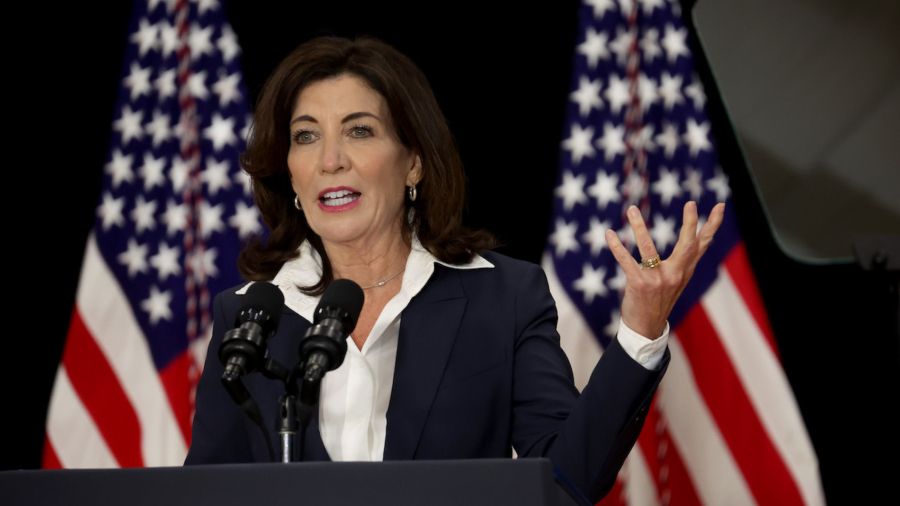Democratic New York Gov. Kathy Hochul and the Democratic majority in the state’s legislature have reached an agreement on a new budget deal that would, among other things, phase out gas hookups in new homes.
Hochul announced on Thursday evening that she had reached a tentative agreement with Democratic House Speaker Carl Heastie and Democratic Senate Majority Leader Andrea Stewart-Cousins on the state’s budget for fiscal year 2024. The budget bill is currently valued at $229 billion.
During a Thursday press conference, Hochul highlighted several aspects of the tentative deal, including a provision to phase out natural gas hookups in new homes.
“Everyone knows we’ve seen the effects of climate change—the storms, the Hurricanes coming to New York, record snow amounts—we’re seeing the effects every single day, not just here, but across the nation. Our budget prioritizes nation-leading climate action that meets this moment with ambition and the commitment it demands.”
Hochul then said, “We’re going to be the first state in the nation to advance zero-emission new homes and buildings beginning in 2025 for small buildings, 2028 for large buildings.”
This zero-emissions standard for homes and buildings entails phasing out a variety of fossil fuel-based utility equipment and home appliances, impacting gas stoves, oil or gas-powered plumbing, heating, lighting, insulation, ventilation, air conditioning, and refrigeration equipment, as well as elevators and escalators that run on fossil fuel.
Hochul began endorsing a phaseout of fossil fuel equipment in January, and lawmakers have indicated the phaseout would be implemented through language added to the state budget.
What’s In The Bill
As the budget agreement is still tentative, Hochul and leaders in the state legislature have yet to publish the actual language for the fossil fuel equipment phaseout and the various other aspects of the state budget omnibus.
Without the full details of the tentative legislative agreement, a coalition of environmental groups called GasFreeNY expressed caution that the final language could include a “poison pill” provision that would give local governments or other entities some ability to circumvent the phaseout of fossil fuel equipment.
“It’s long past time to stop building new buildings that burn fossil fuels for heat and hot water. Building all-electric will save New Yorkers money on energy bills, reduce climate-heating pollution, create jobs in clean energy, and reduce childhood asthma, a win-win for New Yorkers. It is also politically popular, with New Yorkers overwhelmingly in support,” GasFreeNY said in a statement Thursday evening. “On the verge of a final agreement setting historic action into place, Governor Hochul and the Legislature must not snatch defeat from the jaws of victory by including the gas industry’s poison pill provision that could kneecap the law from the start.”
Katy Zielinski, a spokeswoman for Hochul’s office, has said the final budget agreement will not include the “poison pills” the GasFreeNY coalition had warned about.
“The new law will not have any loopholes that will undermine the intent of this measure,” Zielinski told The New York Times on Friday. “There will not be any option for municipalities to opt out.”
NTD News reached out to Hochul’s office for additional details about the tentative budget agreement. Her office did not respond by the time this article was published.
Critics Say Fossil Fuel Phaseout Unaffordable, Unconstitutional
While proponents of the fossil fuel phaseout see it as a way to address climate change and pollution by reducing carbon emissions, critics have raised concerns that the plan will be unaffordable.
The Republican minority in the New York state Senate issued a statement last week urging Hochul to avoid implementing measures phasing out fossil fuel equipment in new buildings and other proposals to phase out fossil fuel equipment in existing buildings by 2035.
“Instead of trying to push an unconstitutional one size fits all fossil fuel ban in our state’s budget, we request that you instead advocate for affordable solutions in pursuing a cleaner energy future, such as independent cost studies and full transparency; support diverse energy sources; keep needed power supply online to ensure reliability of our grid; and oppose unaffordable mandates on consumers,” the Republican minority statement read.
The Republican minority also argued that a recent court case indicates state and local efforts to ban gas stove hookups would be preempted by existing federal law.
In an April 17 decision, a three-judge panel on the 9th U.S. Circuit Court of Appeals ruled in favor of the California Restaurant Association in a lawsuit against the city of Berkeley, California over their ban on new natural gas piping in new buildings. The judges determined the U.S. Energy Policy and Conservation Act of 1975 supersedes Berkeley’s city-level policy on gas piping.

